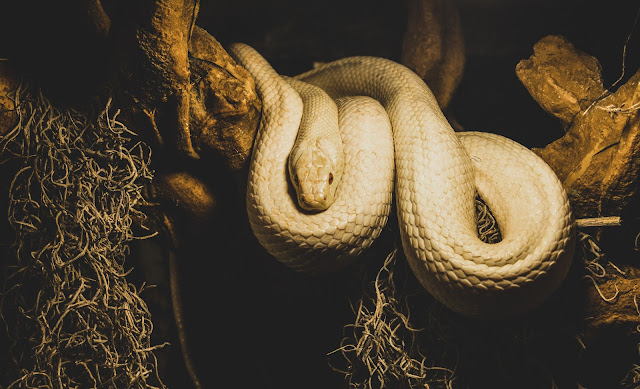Find the best snake, reptile, and amphibians food and supplies from Amazon >>
If you're unfamiliar with caring for pet snakes, this blog post is the perfect place to start. In this post, we'll explore the signs of a sick snake, how to diagnose and treat illnesses, and tips for creating a healthy environment for your pet snake. Keep reading to learn more!
The signs of a sick snake
Snakes can be difficult to care for; it can be hard to tell if they become ill. Recognizing the signs of a sick snake is essential so you can take the necessary steps to help them.
The first signs of illness may be subtle and hard to detect, but recognizing even minor changes in your snake's behavior or appearance is essential. One of the most common signs that a snake is unwell is loss of appetite. If your snake stops eating and/or drinking for several days, this could be a sign of illness, and you should seek medical attention for them.
Other signs that your snake may be unwell include changes in their skin, such as scales becoming sunken or discolored, listlessness and general lethargy, swollen joints, and discharge from the mouth, eyes, or nose. If you notice any of these symptoms, it is essential to contact your vet immediately. The sooner your pet snake is treated, the better their chances of recovering fully.
Find the best snake, reptile, and amphibians food and supplies from Amazon >>
The different types of illnesses snakes can get
Snakes can get many illnesses, depending on their species, environment, and age. Common conditions include respiratory infections, skin issues, parasites, abscesses, metabolic bone disease, and more.
Respiratory infections, or RI, are caused by airborne bacterial or fungal organisms. Symptoms include wheezing, coughing, lethargy, discharge from the nostrils, and difficulty breathing. This can be brought on by cold temperatures or stress.
Skin issues such as scale rot, blister disease, and mites can cause snake discomfort and an impaired ability to shed. Scale rot is a bacterial infection that can cause discoloration and deterioration of scales.
Blister disease is caused by bacteria that break down skin cells and cause raised lesions filled with pus. Mites are tiny insects that live on the snake's body and can cause itching and discomfort.
Find the best snake, reptile, and amphibians food and supplies from Amazon >>
Parasites can include internal parasites such as worms, flukes, and tapeworms and external parasites such as ticks and lice. Internal parasites can lead to diarrhea, vomiting, weight loss, and other digestive issues. External parasites are visible and can cause itching and discomfort.
Abscesses are pockets of pus caused by bacterial infection. They usually appear as bumps on the skin or around the face or head. A veterinarian should treat abscesses because they can become severe if left untreated.
Metabolic bone disease (MBD) is caused by a diet lacking calcium or vitamin D3. Symptoms include deformities in the bones or spine, difficulty moving, swelling in the limbs, and softening of the bones. In severe cases, it can even lead to paralysis.
It is essential to be aware of the different types of illnesses snakes can get so you can spot any potential problems quickly. If you suspect your snake is sick, it is best to take them to a vet immediately for proper diagnosis and treatment.
Find the best snake, reptile, and amphibians food and supplies from Amazon >>
Caring for a sick snake
When your pet snake is ill, it's crucial to provide the necessary care and attention to help it recover. The first step in caring for a sick snake is to determine its type of illness, so you can treat it accordingly.
If your snake has an infectious disease, it's essential to quarantine it from other snakes and people to prevent the spread of the disease. Make sure you keep the snake in a clean environment with fresh bedding and handle it as little as possible. If you must hold the snake, use disposable gloves and wash your hands after each interaction.
If your snake is suffering from malnutrition or dehydration, it must ensure it has access to a proper diet and plenty of water. You may also need to provide additional calcium or vitamins to restore nutritional balance. Consult a veterinarian if you are still determining what diet your particular breed of snake should have.
Finally, you should take your snake to the vet if it displays any signs of illness that don't improve after several days of home treatment. This way, you can ensure your pet snake gets the treatment and medicine needed to improve quickly.
Find the best snake, reptile, and amphibians food and supplies from Amazon >>
